| THE ELECTION AGENDA | |
| June 29, 1999 |
||
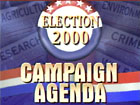
|
|
The NewsHour Media Unit is funded by a grant from the Pew Charitable Trusts. |
|
JIM LEHRER: Finally tonight, another special emphasis discussion about what the 2000 presidential election should be about. Over the next several months, we plan to ask a variety of individuals and groups what issues the candidates should debate and discuss. We have already asked the commandant of the Marine Corps, Charles Krulak, and, last night, four constitutional law experts on the Supreme Court, and tonight a short while ago even the guests on the Medicare reform segment. We launched this effort last week with a discussion. Terence Smith now conducts the next one.
|
|||||||||||||||||||
| Debating "the American character." | ||||||||||||||||||||
|
Bob Kittle, let me begin with you. What would you like to hear debated in the midst of this campaign?
TERENCE SMITH: All right. Lee Cullum, what would be at the top of your list?
TERENCE SMITH: Christine Bertelson in St. Louis, what would you nominate as issues that should be discussed?
|
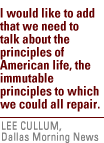 |
|||||||||||||||||||
| Looking at technology's impact. | ||||||||||||||||||||
|
TERENCE SMITH: John Diaz, would you subscribe to that, or add your own?
TERENCE SMITH: And importantly, in your view at the presidential level or that of the candidates? JOHN DIAZ: Absolutely. I think this is a chance for the presidential candidates to come out with a vision for these kinds of issues. TERENCE SMITH: Okay. Pat McGuigan, what about you?
|
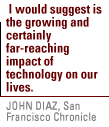 |
|||||||||||||||||||
| National service? | ||||||||||||||||||||
|
TERENCE SMITH: Cynthia Tucker, this is your chance to tell the presidential candidates what you want to hear from them.
I would love to see the candidates talk about disparities in the criminal justice system. Criminal justice is largely a state issue. But I think the president can certainly use his bully pulpit. There are also disparities in the federal system; crime is down. I would like to see the candidates talk about the inequities that make, ensure that far more black men end up in prison than white men. I also agree that there will be a lot of conversation about values in this campaign. I hope that conversation is more about civic values, as Bob suggested, rather than personal morality. And I would like to see at least one candidate propose that, perhaps, we go to a system of required national service. I believe that Americans have lost the spirit of sacrifice, the ability to sacrifice for the common good. And it would be great if at least one candidate would propose compulsory national service for all of our youth. I don't think that will happen but I would like to see it happen. TERENCE SMITH: Lee Cullum, let me give you a chance to respond to Cynthia there and ask you whether you think there is a peace dividend that should be discussed, debated. LEE CULLUM: Well, I really want to second what Cynthia says about national service. I think that's a wonderful idea. You have to remember about the peace dividend what Margaret Thatcher said; the peace dividend is peace. And in order to keep peace, I think we're going to have to increase our military preparedness, but that's a good subject for a debate. On the domestic side I think that we need a patients' bill of rights. I think the president is right about that. The House passed a bill along those lines last year, the Senate lost its nerve and wouldn't. We need to talk about liberalization of banking. There again, the House passed a bill last year; the Senate wouldn't go along. Now, you may think that banking applies only to bankers and insurance people and the securities people. But when the banks began falling down in the late 80's, it applied to all of us. So this is an issue we need to debate as well. I do want to agree with Pat McGuigan, virtue is in the middle. I'm happy to see the centrist tone of the current campaign. |
 |
|||||||||||||||||||
| Will the candidates talk about these issues? | ||||||||||||||||||||
|
TERENCE SMITH: Bob Kittle, you have heard a rang of ideas here. But, is there any mechanism, any way to compel the presidential candidates to debate these things, to focus on these important issues?
TERENCE SMITH: Christine Bertelson, I wonder what you think of the ideas that you have heard here tonight and perhaps some that haven't been mentioned that appear in the e-mail that we get on the special emphasis. They mention campaign finance reform, population control, things like that.
The city of St. Louis has a graduation rate in 1998 of 38.6 percent. In Kansas City, the city schools' graduation rate was 56.5 percent. That's way too low. I think this is a wonderful opportunity to get people into the schools. I also think the Columbine shootings provide a brilliant opportunity for the candidates to hear from teenagers, to hear from adolescents and young people about what their lives are like, about what their schools provide for them, about what it doesn't provide for them, about the kinds of communities and homes that they're growing up in. So, I would love to see the candidates have an open forum with kids. TERENCE SMITH: John Diaz, would you endorse that, briefly? JOHN DIAZ: I would. And I do think that there's one very promising thing that we will have this kind of debate. And that's if you look at the polls, right now, is they do not provide a whole lot of guidance for candidates on what the American people want, even though the vast majority of Americans are feeling very good about their only personal financial situation. The fact is when you ask the threshold question is this country on the right track or the wrong track, more than half are saving wrong track. And I think that bodes well for some definition of the issues from some of the candidates who right now are on the margins. TERENCE SMITH: Pat McGuigan, does this sound like a list of subjects for a presidential campaign, what you've heard here tonight?
And I'd just say to my friend, Lee, that I'm flattered that she agrees with me but she's really agreeing once again with St. Augustine, who originally made that formulation. It's very important that we go forward with the discussion on all these issues, particularly the education question and that we try to find ways to find broad-based agreement to introduce moral norms or moral normative guiding principles in our educational system or we're going to over-rely once again on a panacea, quick fix, whether it's service or increased standards, so-called, or this new infusion of money to help hire a few more teachers and lower the student teacher/pupil ratio a little bit. Until we address this sense of despair that seems to be in the heart of so many of our countrymen and in our young people, I think we're going to fall short of real solutions. TERENCE SMITH: All right. A raft of good ideas. Thank you all very much. JIM LEHRER: We'll be posing similar year 2000 issue questions to many people. You may also participate by visiting our Web site at pbs.org/newshour. |
||||||||||||||||||||
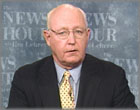 TERENCE
SMITH: It is among our regional commentators, Cynthia Tucker of the
Atlanta Constitution, Lee Cullum of the Dallas Morning News,
Patrick McGuigan of the Daily Oklahoman, and Bob Kittle of the
San Diego Union Tribune, joined tonight by John Diaz of the San
Francisco Chronicle, and Christine Bertelson of the St. Louis
Post-Dispatch. Welcome to you all.
TERENCE
SMITH: It is among our regional commentators, Cynthia Tucker of the
Atlanta Constitution, Lee Cullum of the Dallas Morning News,
Patrick McGuigan of the Daily Oklahoman, and Bob Kittle of the
San Diego Union Tribune, joined tonight by John Diaz of the San
Francisco Chronicle, and Christine Bertelson of the St. Louis
Post-Dispatch. Welcome to you all. 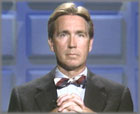 ROBERT
KITTLE: Well, you know, Terry, a poll within the last few months showed
that 87 percent of Americans feel that there's something fundamentally
wrong with America's moral condition; that we've experienced a decline
in our civil society, that perhaps the American character is in decline.
So I would like to hear a debate from the candidates about our values,
our values as a nation, the values that define what it means to be an
American. And frankly there are a lot of competing value systems today
that create confusion in our society. It's more difficult, I think,
today to assert a sense of shared values in America than it was a few
decades ago. We debate endlessly and disagree over the issues that divide
us, whether it's abortion or gun control or whatever, but we haven't
focused very much on the core values that unite us as a society, that
provide the moral underpinnings of our society. And I'm really talking
about our civic society, not so much our private morality but our public
sense of obligation to society, the notion of individual responsibility
and personal accountability. So that's what I would like to hear the
candidates talk about. Our values and what they should be.
ROBERT
KITTLE: Well, you know, Terry, a poll within the last few months showed
that 87 percent of Americans feel that there's something fundamentally
wrong with America's moral condition; that we've experienced a decline
in our civil society, that perhaps the American character is in decline.
So I would like to hear a debate from the candidates about our values,
our values as a nation, the values that define what it means to be an
American. And frankly there are a lot of competing value systems today
that create confusion in our society. It's more difficult, I think,
today to assert a sense of shared values in America than it was a few
decades ago. We debate endlessly and disagree over the issues that divide
us, whether it's abortion or gun control or whatever, but we haven't
focused very much on the core values that unite us as a society, that
provide the moral underpinnings of our society. And I'm really talking
about our civic society, not so much our private morality but our public
sense of obligation to society, the notion of individual responsibility
and personal accountability. So that's what I would like to hear the
candidates talk about. Our values and what they should be. 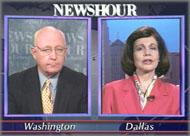 LEE
CULLUM: Well, Terry, first I would like to add something to what Bob
said about values. You know, values is a subjective term. It really
does vary from person to person. I would like to add that we need to
talk about the principles of American life, the immutable principles
to which we could all repair. But I would also say turning to a more
practical side we need to be talking about defense. I think truly it
is defense, stupid. We see that our military has deteriorated to some
extent. It had a great success in Kosovo but we ran out the cruise missiles.
We need to talk about increasing defense spending; we need to talk about
whether it's to go for high-tech weapons or whether it's to maintain
the military at its current level. We also need to talk about trade.
We need a fast-track amendment and we need to talk about global financial
architecture, a new global financial system to ward off the storms that
blew into Asia in 1997 and Russia in '98 and Brazil in '99 of this year.
So, principles and some critical foreign policy issues are on my list.
LEE
CULLUM: Well, Terry, first I would like to add something to what Bob
said about values. You know, values is a subjective term. It really
does vary from person to person. I would like to add that we need to
talk about the principles of American life, the immutable principles
to which we could all repair. But I would also say turning to a more
practical side we need to be talking about defense. I think truly it
is defense, stupid. We see that our military has deteriorated to some
extent. It had a great success in Kosovo but we ran out the cruise missiles.
We need to talk about increasing defense spending; we need to talk about
whether it's to go for high-tech weapons or whether it's to maintain
the military at its current level. We also need to talk about trade.
We need a fast-track amendment and we need to talk about global financial
architecture, a new global financial system to ward off the storms that
blew into Asia in 1997 and Russia in '98 and Brazil in '99 of this year.
So, principles and some critical foreign policy issues are on my list.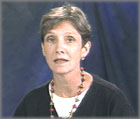 CHRISTINE
BERTELSON: I think it would be very interesting if we could put the
frame on the Campaign 2000 of what helps our children grow and thrive
and what sustains our families. And this is partly a discussion about
values and shared standards, but it's also about delivery systems because
really the government is the delivery system for our best intentions
for our children. And if we put that frame on it, the issues that pop
up right away for younger children are going to be child care and health
care as children get older. The front line of defense for them is the
school system. And what if we, using this same frame, looked at our
schools as not the responsibility of superintendents and school board
members and teachers, exclusively, but a shared responsibility for everyone
in the community? We would all have a role to play. We would know what
that rule was; we would hold each other accountable for delivering on
that.
CHRISTINE
BERTELSON: I think it would be very interesting if we could put the
frame on the Campaign 2000 of what helps our children grow and thrive
and what sustains our families. And this is partly a discussion about
values and shared standards, but it's also about delivery systems because
really the government is the delivery system for our best intentions
for our children. And if we put that frame on it, the issues that pop
up right away for younger children are going to be child care and health
care as children get older. The front line of defense for them is the
school system. And what if we, using this same frame, looked at our
schools as not the responsibility of superintendents and school board
members and teachers, exclusively, but a shared responsibility for everyone
in the community? We would all have a role to play. We would know what
that rule was; we would hold each other accountable for delivering on
that. 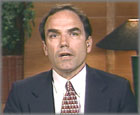 JOHN
DIAZ: Yes, I would certainly agree with Bob's opening comment of I think
values is going to be one of the overriding issues of the campaign.
But also we're in a very unusual time coming up in 2000 with a relative
period of peace and unparalleled prosperity, where candidates really
have an opportunity to get beyond the reactive vote, the sound bite,
the poll-driven mode they've been in recent years to look at issues
in the future that really affect our every day lives. And one of those
areas I would suggest is the growing and certainly far-reaching impact
of technology on our lives. It affects everything from privacy issues,
the databases that are being collected on ordinary Americans, the economy,
things like should the Internet businesses be put on an even playing
field with other retailers, as well as a lot of social issues are intertwined
as well, things like gambling or pornography. In all of these areas
I think there's really a role for a discussion of public policy and
where it comes in there, and it goes well beyond whether Al Gore did
or did not invent the Internet.
JOHN
DIAZ: Yes, I would certainly agree with Bob's opening comment of I think
values is going to be one of the overriding issues of the campaign.
But also we're in a very unusual time coming up in 2000 with a relative
period of peace and unparalleled prosperity, where candidates really
have an opportunity to get beyond the reactive vote, the sound bite,
the poll-driven mode they've been in recent years to look at issues
in the future that really affect our every day lives. And one of those
areas I would suggest is the growing and certainly far-reaching impact
of technology on our lives. It affects everything from privacy issues,
the databases that are being collected on ordinary Americans, the economy,
things like should the Internet businesses be put on an even playing
field with other retailers, as well as a lot of social issues are intertwined
as well, things like gambling or pornography. In all of these areas
I think there's really a role for a discussion of public policy and
where it comes in there, and it goes well beyond whether Al Gore did
or did not invent the Internet.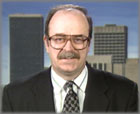 PATRICK
McGUIGAN: Well, everybody has stolen my issues, the things that I was
going to raise. Let me supplement a little bit. I think every point
that's been raised is excellent. I would just like to see a -- presuming
things stay on track the way they now look and we get debate between
a compassionate conservative and a practical idealist or a practical
liberal, as Mr. Gore is running as -- I'd like to try to define what
those things mean. And I think there's a chance, at least that, the
nature of the debate will be a little different than it's been in recent
history. There's a friend of mine, Theo "Doc" Bentsen who
has run the Education and Employment Ministry here in Oklahoma city
to help people in many cases just getting out of prison learn how to
develop a work ethic, and he considers himself a Truman liberal. And
I, of course, consider myself a Reagan conservative. And Doc Benson
has been proposing of late that the nature of discussion is changing
in the country and actually going in a positive direction. And I hope
he's right. I hope we can have this discussion and begin to find some
common ground because thousands, seventeen hundred years ago, St. Augustine
said virtue stands in the middle. And rather than the word values, I
think the word virtue is very important. How can we reestablish the
shared principles or virtues?
PATRICK
McGUIGAN: Well, everybody has stolen my issues, the things that I was
going to raise. Let me supplement a little bit. I think every point
that's been raised is excellent. I would just like to see a -- presuming
things stay on track the way they now look and we get debate between
a compassionate conservative and a practical idealist or a practical
liberal, as Mr. Gore is running as -- I'd like to try to define what
those things mean. And I think there's a chance, at least that, the
nature of the debate will be a little different than it's been in recent
history. There's a friend of mine, Theo "Doc" Bentsen who
has run the Education and Employment Ministry here in Oklahoma city
to help people in many cases just getting out of prison learn how to
develop a work ethic, and he considers himself a Truman liberal. And
I, of course, consider myself a Reagan conservative. And Doc Benson
has been proposing of late that the nature of discussion is changing
in the country and actually going in a positive direction. And I hope
he's right. I hope we can have this discussion and begin to find some
common ground because thousands, seventeen hundred years ago, St. Augustine
said virtue stands in the middle. And rather than the word values, I
think the word virtue is very important. How can we reestablish the
shared principles or virtues?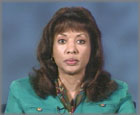 CYNTHIA
TUCKER: Well, Terry, I would, first of all, disagree with something
that Lee said. I am hoping that in this period of unparalleled prosperity
and relative peace in the world that the candidates will take the opportunity
to get out of the box just a little bit, propose some things a little
bit different. And I'm hoping that the candidates will actually talk
about decreasing military spending, rather than increasing it. I don't
think that we're spending -- I think we're spending far too much money
on the military. Maybe we're spending it in the wrong places -- too
much on high-tech weapons, perhaps. But we spend ten times as much money
-- excuse me -- we spend more money than the next ten countries combined
on military affairs, and I think that's too much.
CYNTHIA
TUCKER: Well, Terry, I would, first of all, disagree with something
that Lee said. I am hoping that in this period of unparalleled prosperity
and relative peace in the world that the candidates will take the opportunity
to get out of the box just a little bit, propose some things a little
bit different. And I'm hoping that the candidates will actually talk
about decreasing military spending, rather than increasing it. I don't
think that we're spending -- I think we're spending far too much money
on the military. Maybe we're spending it in the wrong places -- too
much on high-tech weapons, perhaps. But we spend ten times as much money
-- excuse me -- we spend more money than the next ten countries combined
on military affairs, and I think that's too much. 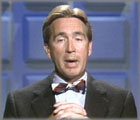 ROBERT
KITTLE: Well, we can't compel the candidates, of course, Terry, but
I think a program like this helps focus the candidates on what Americans
are thinking about. One of the great things about a presidential campaign
is that it does force the candidates to get out and to rub elbows with
the grubby side of America, to hear what Americans are thinking, to
look average Americans in the eye. And I think if average Americans
speak up along with the news media and talk about the important things
and not focus so much on the horse race aspects of a campaign or the
superficial aspects of the candidates, we can compel, we can bring about
a real national debate about these issues and about our values and our
principles and that, after all, is what an election really is about.
It should be a national debate. It shouldn't simply be about two individuals.
ROBERT
KITTLE: Well, we can't compel the candidates, of course, Terry, but
I think a program like this helps focus the candidates on what Americans
are thinking about. One of the great things about a presidential campaign
is that it does force the candidates to get out and to rub elbows with
the grubby side of America, to hear what Americans are thinking, to
look average Americans in the eye. And I think if average Americans
speak up along with the news media and talk about the important things
and not focus so much on the horse race aspects of a campaign or the
superficial aspects of the candidates, we can compel, we can bring about
a real national debate about these issues and about our values and our
principles and that, after all, is what an election really is about.
It should be a national debate. It shouldn't simply be about two individuals.
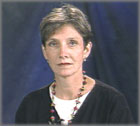 CHRISTINE
BERTELSON: I think all of those are very important. I want to piggyback
again on an idea Cynthia put forward, the idea of national service.
A great opportunity is in the schools. In the St. Louis City schools,
for example, there has been a severe teacher shortage that we don't
seem to be able to get our arms around, and the performance of students
is very poor partly because of that.
CHRISTINE
BERTELSON: I think all of those are very important. I want to piggyback
again on an idea Cynthia put forward, the idea of national service.
A great opportunity is in the schools. In the St. Louis City schools,
for example, there has been a severe teacher shortage that we don't
seem to be able to get our arms around, and the performance of students
is very poor partly because of that. 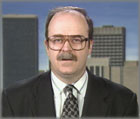 PATRICK
McGUIGAN: Absolutely. I'm a bit dubious about national service in terms
of a requirement, although I think the virtue or the value, if you will,
of voluntary service is at the center of the effectiveness of our communities
-- being able to do things outside the reach of government. So I would
endorse the idea of voluntary service. But I think any kind of a compulsion
should probably be avoided.
PATRICK
McGUIGAN: Absolutely. I'm a bit dubious about national service in terms
of a requirement, although I think the virtue or the value, if you will,
of voluntary service is at the center of the effectiveness of our communities
-- being able to do things outside the reach of government. So I would
endorse the idea of voluntary service. But I think any kind of a compulsion
should probably be avoided.